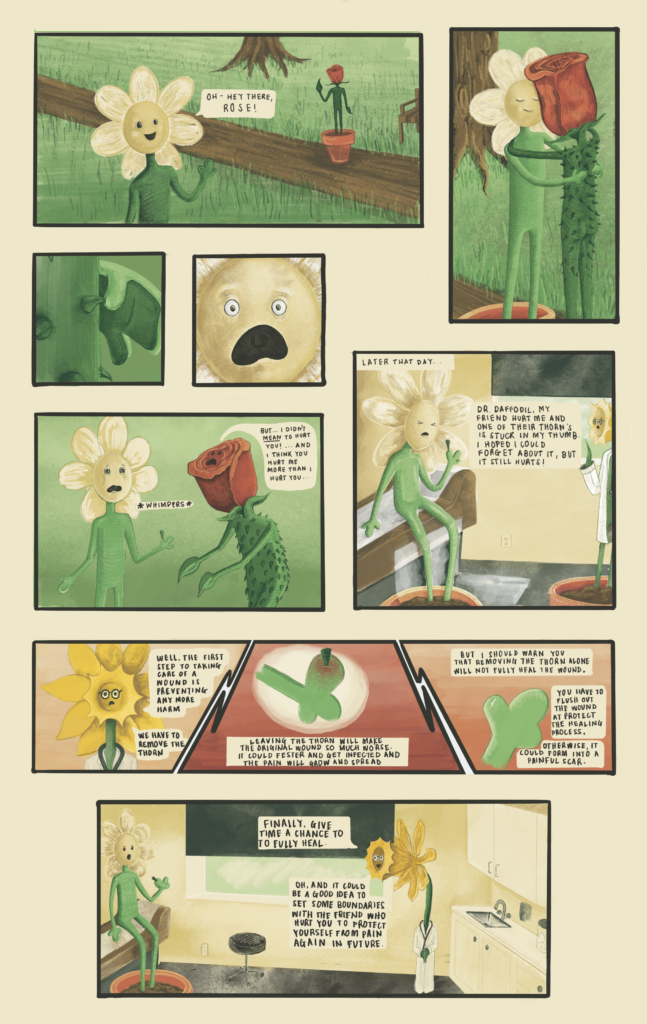Post written by Ella Moore

I think that the beauty of human relationships (friendships, romantic relationships, familial relationships, etc…) is that completely different individuals can come together and their unique strengths and weaknesses balance out in a way that they become stronger together than apart. We instinctively crave this since humans are social creatures and this desire for connection and relationships is literally written into our DNA. However, the implicit exchange for intimacy is vulnerability, so the stakes for getting hurt from the relationship than from a stranger are much higher. So what can we do if someone we trusted hurts us, either unintentionally or intentionally? What if this person does not want to resolve the situation or cannot be reasoned with?
I recently ran into this experience where someone else’s mental health triggered my own mental health and it caused the breakdown of a friendship and I got hurt in the crossfire. This situation was incredibly reminiscent of a similar experience of getting hurt by someone close to me in high school, with the fundamental fear and trigger being perceived rejection. Both times I was unable to receive closure or accountability from the other person and this sends me reeling! I hyper-fixate on it for months, even years after it, and during the time I didn’t have as many healthy coping skills at my disposal, I would lash out to make them feel bad for the pain they have caused and to get a reaction. Now I know this is only giving that person what they want, which is to know that they have caused pain and internal/external chaos, I don’t like to give into this urge as easily as I did when I was 16. I wanted to take an active role in processing this so I can move on from it in a healthy way and not let it derail my recovery, but I was at a loss as to how to start to heal from it
At around the same time as the second incident, I coincidentally started seeing a therapist again for the first time in a few years. I lamented to her about the situation and the pain it caused and the way I was still so hung up on it, and she offered her first solution in such simple terms that I felt compelled to share them with you all too.
She compared an emotional wound to a physical one and gave me some basic steps based on this concept to help myself heal from an event or person that caused emotional pain:
1. Assess the seriousness of the “injury”
- Like physical injuries, emotional injuries can need more professional treatment and there is no shame in that!
- I sought out extra guidance from my therapist and my psychiatrist, and I even reached out to the Crisis Text Line (TEXT 741741) because it was something I didn’t feel equipped to deal with on my own.
** If you feel able to address the “injury” by yourself, the following steps can provide a guide for heal from an emotional wound **
2. Remove the thing causing the pain, like the thorn or a splinter, so it can stop doing any more harm.
- Remove the person (permanently or temporarily) or remove yourself from the environment that is causing harm (permanently or temporarily)
- If you don’t remove the “thorn”, it has the potential to get infected or become a more serious injury than the initial jab.
- Enforce boundaries to restrict access to you:
- “I need to take a week or so to process this so I am going to block you until then, I hope you can respect this.”
- “I feel hurt by X action. I need you to respect that I need some physical distance from you for X until I feel better/safe/understood.”
3. Wash out/clean the wound
- Taking out the “thorn” is a good first step, but without washing out the pain and taking the appropriate self-care steps the wound will not heal properly and could turn into a painful emotional scar.
- Unprocessed “bad” feelings can lead to resentment and general fatigue.
- It is better to cleanse yourself of as much as you can so it doesn’t fester like a real wound would.
- Let all of the “bad” emotions (there are no bad emotions, just unwanted feelings) flow out:
- Be angry, be mad, cry, scream, vent, b**ch, grieve, or whatever you are feeling that you may be judging yourself for.
- (As long as it is not hurting yourself or others)
4. Bandage / protect the wound
- Even after you have taken care of the initial injury, the healing process can still be interrupted or impacted by the actions of others.
- It’s important to keep the wound clean from any toxic people or stressful situations that can worsen the initial injury.
- Practice a lot more self-care and self-compassion during this time to prevent any internal damage and provide a buffer for any outside influence that could make the pain worse.
5. Let time start to repair the intensity of the pain
- It won’t ever fully go away, at least not cognitively because we can remember it happening and we can remember the pain it brought us in the moment.
- HOWEVER, it does not need to continue being painful after we have extracted all of the healthy lessons we can learn from something like this
- “This person is reacting more to their internal sense of chaos than anything I have done to deserve or warrant being treated badly,” “I deserve to be treated with respect,” “I need X from a relationship with someone to feel safe” … etc…
- Slowly but surely the pain does dull and hopefully the conflict can be resolved, but even if it doesn’t you know that you have the strength and tools to get through it.
This formula is not guaranteed to provide a complete fix every time, however it does provide the framework to start some healthy healing.
This post was an excerpt from our spring newsletter. For more content like this, check out the newsletter!


